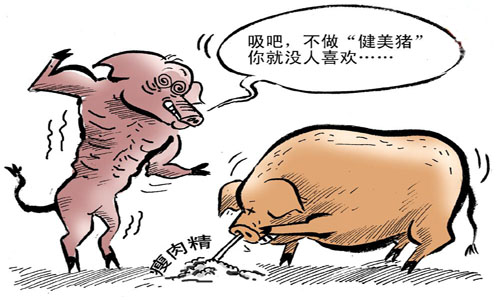Learning Chinese: Tainted meat fears sap athletes' game

Chinese athletes may not be performing as well as they could, as they
forsake meat for fear of chemical contamination that would interfere with urine tests. With the London Olympics around the corner, this poses quite a problem.The Chinese women's volleyball team lost 3-0 to the US at the 2012 FIVB World Grand Prix finals which concluded Sunday in Ningbo, China. Before that, China lost three out of their four other matches to Brazil, Turkey, and Thailand.
Strangely, in all of these games, it seemed that the Chinese team could play well for the first two sets but began to flag in the later half of the game, Chinese media reported.
The loss might be connected to the fact that the players have not had any meat for three weeks, explained the coach.
"We dare not eat meat when competing outside [of our home base] for fear of clenbuterol … and it does affect our strength," said Yu Juemin, head coach of the Chinese women's volleyball team, according to the Beijing News on Monday.
More than one athlete had cramps during the final games, the paper reported.
Clenbuterol is banned by some sports organizations including the International Olympic Committee. But Chinese farmers and producers are known to be feeding the substance to farm animals to get more lean meat, faster.
Some Web users mocked the team for the "flimsy excuse," but some experts believe meat consumption is indeed related to athletes' physical condition and performance.
"For athletes engaging in high-intensity training or competition, they definitely must consume enough animal protein from lean meat such as beef, mutton and pork, more so than ordinary people," said Zhao Jisheng, an associate professor at the College of PE and Sports at Beijing Normal University.
To eat or not to eat meat is a dilemma athletes and their coaches struggle with, said Zhao, who also helps train elite kayakers.
"But I think with more caution, special suppliers and testing methods, we can avoid the problem [of contaminated meat]," he added.
Contaminated food is a real concern for Chinese athletes.
The World Anti-Doping Agency has warned athletes to be cautious when traveling to competitions in China and Mexico because of meat contaminated with clenbuterol.
China's judo champion Tong Wen was banned for two years after testing positive for clenbuterol in 2009. Her ban was lifted in March 2011.
Since the incident, the Tianjin judo team, where Tong trains, has been raising its own pigs, chicken and ducks to keep the meat safe, reported the China Youth Daily.
In January, some 700 athletes in Jiangsu Province went without meat for 15 days after samples of the beef they were served were found with excessive levels of clenbuterol. A local farmer donated 3 tons of pork to the team after reading the news, promising there were no additives in the meat.
In March, China's national sports administration sourced its meat supply for the next four years from the State-owned conglomerate China National Cereals, Oils and Foodstuffs Corporation to secure additive-free meat. The company flew meat for the badminton team during the Asia Badminton Games in Qingdao, Shandong Province last year.
Coach Yu said that for the next 20 days before the Olympics, the team would have ample supplies of safe meat.
The Chinese women's volleyball team had previously won a gold and a bronze medal at the Athens and Beijing Olympics.
Chinese you need:
Forsake:放弃 (fàng qì)
Contamination:污染 (wū rǎn)
Urine test:尿检 (niào jiǎn)
Clenbutero:瘦肉精 (shòu ròu jīng)
Cramp:抽筋 (chōu jīn)
Ban:禁止 (jìn zhǐ)
Lean:瘦的 (shòu de)
Flimsy:不足信的 (bù zú xìn de)
Athlete:运动员 (yùn dòng yuán)Dilemma:困境 (kùn jìng)
Cautious:谨慎的 (jǐn shèn de)
Judo:柔道 (róu dào)
Sample:样本 (yàng běn)
Conglomerate:联合型大企业 (lián hé xíng dà qǐ yè)
Coach:教练 (jiào liàn)